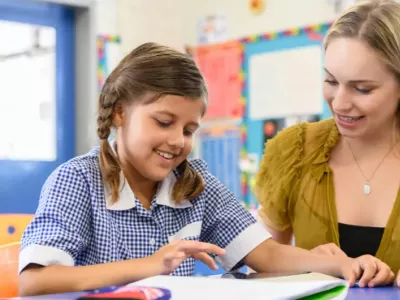Boosting kids’ emotional resilience – a mental health insurance policy ahead of future disasters

As another storm and cyclone season approaches, Queensland families are being encouraged to add emotional resilience to their preparation checklist to help children and young people cope with any anxiety or worries they may be experiencing.
Co-author of the Fear-Less Triple P program and Associate Professor at The University of Queensland’s School of Psychology, Vanessa Cobham, said that children and young people represent a particularly vulnerable group following natural disasters[i] such as floods and cyclones.
“As a result of the significant disruption to families’ lives, the fallout from natural disasters can take a huge toll on children and parents’ mental health, with research showing that approximately five to 15 per cent of Australian children experience significant mental health symptoms following disaster exposure[ii],” Dr Cobham said.
“Parents and children alike may have experienced or continue to experience a range of emotions after recent disasters, including grief, anger, fear, sadness, and anxiety – this is normal,” she said.
“Thankfully, there is now a greater understanding of the impacts that natural disasters have on children and young people and there is a lot of work being done to help disaster affected communities move towards a journey of positive recovery.
“Parents can draw on their recovery experience and use the skills they already have in their parenting toolbox to help build their children’s emotional resilience before disasters occur,” Dr Cobham said.
“Just like you would prepare your house ahead of storm season, being emotionally prepared is also important for both parents and children so they can cope with whatever life throws at them in the future.
“As families prepare their emergency checklist this coming storm and cyclone season, parents may also like to add an ‘emotional resilience preparation plan’ like the one we’ve prepared below:
Emotional Resilience Preparation Plan
- Be a role model – show ways to deal with strong emotions to encourage a sense of being calm and prepared
- Be prepared - talking about the possibilities of what might happen and how to prepare is a good way to help kids keep calm and encourage realistic thinking rather than “imagining the worst”. This may include involving kids in some simple tasks as part of the planning and preparation.
- Show you’re listening - kids (and adults) may experience worry in the lead-up to the cyclone and storm season so listening to their concerns and helping them to accept their feelings is key to strengthening their emotional resilience. Encourage them to acknowledge their feelings and let them pass.
- Emotional support team - make a list of family members, friends, and emergency help lines you and your children can call if they are feeling overwhelmed or anxious such as Kids Helpline or Lifeline.
- Parenting toolbox – look at the strategies already in your parenting toolbox to help guide you through this period, including a list of programs or organisations where you can access parenting support how and when you want.
Triple P International Country Director, Carol Markie-Dadds, said that thanks to generous state government funding, Queensland parents and carers can access free, online parenting support 24/7. Available online programs are Fear-Less Triple P Online, Triple P Online, and Teen Triple P Online, plus a guide to parenting during COVID-19, at www.triplep-parenting.net.au. Some support is available in Arabic, Spanish and other languages.
-ENDS-
MEDIA CONTACT: Cate Kennedy, Public Relations Manager – 0477 286 557 or cate.kennedy@triplep.net
[i] Cobham, V. E. & McDermott, B. (2014). Perceived Parenting Change and Child Posttraumatic Stress Following a Natural Disaster. Journal of Child and Adolescent Psychopharmacology, 24(1), 18-23.http://doi.org/10.1089/cap.2013.0051
[ii] Cobham, V. E. & McDermott, B. (2014). A stepped-care model of post-disaster child and adolescent mental health service provision. European Journal of Psychotraumotology, 5(24294), 1-10.

